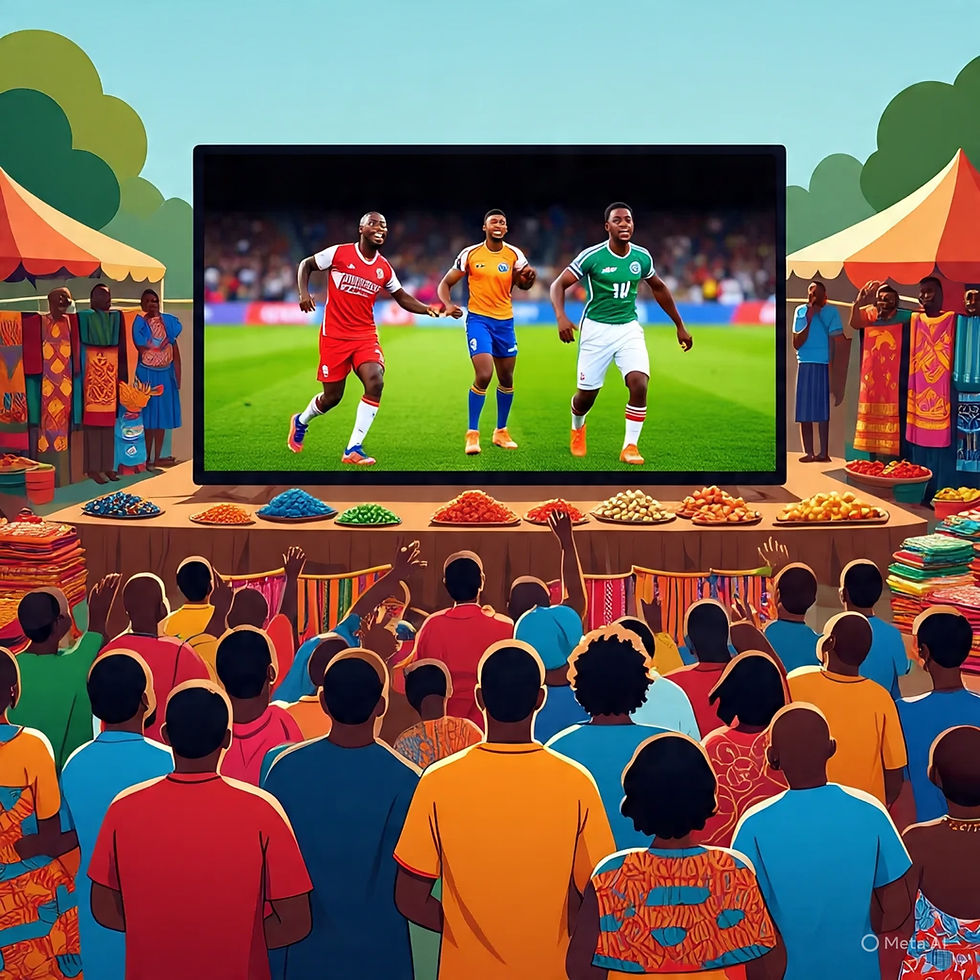What Are Music Distribution and Publishing Companies?
- orpmarketing
- Jun 12, 2025
- 6 min read

Music Distribution Companies:
Definition: Music distribution companies are entities that deliver music from artists or labels to various platforms, such as streaming services (e.g., Spotify, Apple Music), digital stores (e.g., iTunes), and sometimes physical retailers. They ensure music is available for purchase, streaming, or download globally or in specific regions.
Role: They handle the logistics of getting music onto platforms, manage metadata (e.g., song titles, artist names, album artwork), and often collect and distribute royalties earned from streams, downloads, or sales. Some also offer marketing or promotional services.
Examples in Africa: Africori, Content Connect Africa, Electromode Ingrooves, Mdundo, and Nazwo Digital.
Music Publishing Companies:
Definition: Music publishing companies manage the rights to a songwriter’s or composer’s musical compositions (not the recordings themselves, which are handled by labels or distributors). They focus on licensing music for use in TV, film, advertisements, and other media, and collecting royalties for performances, mechanical reproductions, and sync licenses.
Role: Publishers register songs with royalty collection societies (e.g., SAMRO, CAPASSO in South Africa), pitch music for licensing opportunities, and ensure songwriters receive their share of royalties. They also protect intellectual property and negotiate deals.
Examples in Africa: Downtown Music Publishing Africa (formerly Sheer Publishing), Gallo Music Publishers, CAPASSO.
How Do They Operate in Africa?
Distribution Companies in Africa:
Digital Focus: With the rise of mobile internet and smartphone penetration (46% mobile subscriptions in sub-Saharan Africa), distribution companies like Mdundo, Africori, and Electromode Ingrooves focus on digital platforms. They distribute to global services like Spotify, Apple Music, and local platforms like Boomplay, which is prominent in Nigeria.
Mobile-Centric Models: In Africa, where broadband is rare and mobile data dominates, distributors often partner with mobile service providers to bundle music with data plans or offer freemium models to combat piracy. For example, Mdundo, dubbed the “Spotify of Africa,” disperses half its income directly to artists and serves over 5 million active users.
Challenges: Weak distribution networks, high data costs, and piracy are significant hurdles. Many artists struggle to access paying customers, and distributors may prioritize popular artists, leaving smaller ones with less leverage.
Operations: Companies like Africori provide distribution, marketing, and artist development, connecting independent artists to over 242 international platforms. Electromode Ingrooves also offers physical distribution for CDs and DVDs in South Africa.
Publishing Companies in Africa:
Royalty Collection: Publishers like CAPASSO and SAMRO in South Africa collect performance and mechanical royalties, but infrastructure limitations in many African countries hinder efficient royalty administration. For instance, Cameroonian CMOs failed to pay royalties for years until 2022.
Licensing and Sync: Publishers like Gallo Music Publishers and Downtown Music Publishing Africa focus on sync licensing for TV, film, and ads, leveraging extensive catalogs of African music. For example, Gallo represents iconic artists like Ladysmith Black Mambazo and pitches their music globally through partnerships with Sony Music Publishers.
Challenges: Insufficient intellectual property protection, lack of industry education, and weak legal frameworks limit royalty collection and artist earnings. In South Africa, only a tiny fraction of royalties (R108,000 vs. R150 million to foreign rights holders) goes to local artists due to market dynamics favoring Western music.
Operations: Publishers often work with CMOs to register songs and collect royalties globally. Downtown Music Publishing Africa, for instance, uses a global network to collect royalties in over 215 countries.
How to Make Their Work Profitable and Beneficial for African Musicians
To align the operations of distribution and publishing companies with the needs of African musicians, the following strategies can enhance profitability and benefits, addressing key issues like fair compensation, market access, and infrastructure:
Tailored Monetization Models:
Need Addressed: African artists often receive a small share of streaming revenue due to low subscription rates and piracy.
Solution: Develop affordable subscription models or ad-supported freemium services tailored to low-income markets. For example, Mdundo’s model of sharing 50% of its $2 million annual revenue with artists is a step toward fairer compensation. Distributors could also explore microtransactions or mobile data-bundled music access to reduce reliance on expensive subscriptions.
Publishing Action: Publishers should focus on sync licensing (e.g., for Netflix, ads, or games), which has proven lucrative for artists like Burna Boy and Bisa Kdei, whose songs were featured in FIFA 21 and Netflix’s “Jingle Jangle”. This diversifies income beyond streaming.
Strengthening Local Infrastructure:
Need Addressed: Limited label support, weak publishing structures, and inadequate copyright enforcement stifle artist earnings.
Solution: Invest in local recording studios, training programs, and CMOs to improve royalty collection. Initiatives like Afreximbank’s $500M Creative Industry Support Fund can finance such infrastructure. Distribution companies should partner with local tech firms to create affordable platforms, reducing dependence on global giants like Spotify.
Publishing Action: Publishers like CAPASSO should streamline royalty collection processes and educate artists on copyright registration. Programs like Music Business Academy for Africa can teach artists about publishing and licensing to maximize earnings.
Combating Piracy and Improving Digital Rights Management:
Need Addressed: Piracy and unregulated digital markets reduce artist revenue, as seen in cases like Kenyan artist Eunice Njeri, who was underpaid by her distributor.
Solution: Implement robust Digital Rights Management (DRM) tools to curb piracy, as suggested by research in Nigeria. Distributors can offer transparent royalty tracking systems, ensuring artists see accurate earnings data. Blockchain-based platforms could also ensure fair royalty distribution.
Publishing Action: Publishers should advocate for stronger copyright laws and work with governments to enforce intellectual property rights, as demanded by Ghana’s “Alliance For Change in Ghana Music”.
Global Market Access and Partnerships:
Need Addressed: Limited market access restricts African artists’ international exposure and earnings.
Solution: Distributors like Africori and Electromode Ingrooves should leverage partnerships with global platforms (e.g., Spotify, Apple Music) to promote African genres like Afrobeats and Amapiano. For example, Platoon’s expansion in Africa, offering advances and health insurance, has helped artists like Teni and Simi gain global traction.
Publishing Action: Publishers like Downtown Music Publishing Africa should expand sync opportunities through global networks, as seen with their partnership with Songtrust to empower African songwriters. Collaborations with international publishers (e.g., Warner Chappell, Sony/ATV) can amplify African music’s reach.
Empowering Independent Artists:
Need Addressed: Many African artists lack the resources to navigate the industry independently and are exploited by unfair contracts.
Solution: Distributors like Distrokid or Nazwo Digital should offer simple, transparent platforms for independent artists to upload music and retain 100% of their rights, as Nazwo does. Education on contract terms and royalties is crucial, as highlighted by the “Alliance For Change in Ghana Music”.
Publishing Action: Publishers should offer fair commission splits (e.g., 50/50 or better) and avoid exploitative deals. Programs like Gender@Work, which train women in music business skills, can empower marginalized artists.
Diversifying Revenue Streams:
Need Addressed: Over-reliance on streaming limits income, especially in markets with low subscription rates.
Solution: Distributors should promote alternative revenue streams like live performances, merchandise, and brand endorsements. For example, Nigerian artists earned $38 million in royalties in 2024, boosted by collaborations and endorsements. Platforms like PopRev allow fans to invest in artists, linking profits to streaming performance.
Publishing Action: Publishers can pitch music for cross-industry collaborations (e.g., tourism, fashion), as Afrobeats has driven tourism in Nigeria. Licensing music for global media, as Gallo does, can also increase earnings.
Government and Policy Support:
Need Addressed: Weak legal frameworks and lack of government support hinder industry growth.
Solution: Distributors and publishers should advocate for policies that enforce copyright and provide funding, as suggested by Afreximbank’s report. Governments can subsidize data costs or support local platforms to make music more accessible.
Publishing Action: Publishers should collaborate with CMOs like SAMRO to lobby for laws ensuring steady royalty income, as demanded by Ghanaian artists.
Benefits for African Musicians
Financial Stability: Fairer royalty splits, transparent tracking, and diversified income streams (sync licensing, endorsements) ensure sustainable earnings.
Global Reach: Partnerships with international platforms and publishers increase exposure, as seen with artists like Burna Boy and Black Coffee.
Empowerment: Education and transparent contracts empower artists to retain control over their work and negotiate better deals.
Cultural Preservation: Promoting local genres like Amapiano and Afrobeats preserves cultural heritage while boosting economic contributions, as Nigerian music adds $2 billion to the economy.
Inclusivity: Programs targeting women and marginalized communities (e.g., Gender@Work) ensure broader participation in the industry.
By addressing these needs through tailored strategies, distribution and publishing companies can create a more equitable and profitable ecosystem for African musicians, aligning with their real-world challenges and aspirations.




Comments